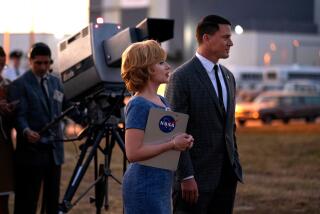Review: Ron Howard takes us to âMarsâ (and itâs a bumpy ride)
With pulling up stakes looking pretty good to some people right now, National Geographic Channelâs big new techno-colonial docudrama âMarsâ has gained unexpected timeliness.
The six-part series, which premieres Monday, describes the campaign to settle humans on our nearest and most hospitable â yet still pretty inhospitable â planetary neighbor. This âMarsâ is half aspirational documentary, half speculative fiction.
With Ron Howard (âApollo 13â) and Brian Grazer among the executive producers, it is not surprisingly a glossy, classy, Rolls-Royce of a production. Both the documentary footage and the staged footage set in 2033 smack of a generous budget; itâs easy on the eyes. But though the alternating elements get equal time, they arenât equally interesting, and the series is engaging and frustrating by turns.
Although the fictional parts are arranged to be dramatic â a pioneer story, full of obstacles â the staged scenes on Mars and on Earth are oddly plodding and ponderous, pious and platitudinous. (âWe dream. Thatâs who we are. Down to our bones, our cells. ⌠We crossed the oceans, we conquered the skies, and when there were no more frontiers on Earth, we launched ourselves among the stars.â) Iâm pretty sure thereâll be jokes, practical and otherwise, on the first flight to Mars, and that some of them will be rude; it lasts seven months, after all.
The documentary passages are by far the more exciting, eccentric and fun. Among the contemporary, real-world commentators (in the two episodes available for review) are Americaâs astronomer Neil deGrasse Tyson; Scott Kelly, who spent a year in the International Space Station to test the effects of long-term space flight on the body; and mogul Elon Musk, whose SpaceX corporation is determined to make Mars habitable. Musk â who believes we need to become a âspacefaringâ race because weâre going to throw away this planet like a used tissue or be fried by the sun in about a billion years â is the apparent model for the seriesâ fictional visionary entrepreneur, leading an international coalition of space agencies and private industry.
Like the settings, the young, international crew of the space ship Daedalus looks good â actors youâd be as likely to see on a Milan runway as on a Cape Canaveral gangway. There are no Scott Kellys among them â stocky, bald, bespectacled. They do their best to make their parts dimensional, but they are not given much to work with.
They are accompanied by a talking computer (Voice: British, female) that chimes in with warnings such as âYour battery power is at 2%â and âRecommend immediate manual replacement of faulty circuit.â It seems to me that the humans make bad, if âheroic,â decisions here, and that their space gear provides a shocking lack of redundancy and fail-safe systems. It is true that things go wrong; but things are interesting when they go right too. Science, engineering â I would have liked more of that. Where are the nerds?
But whatâs largely missing here is any sense that the enterprise might be exhilarating, mind-blowing, a kick â only important and dangerous. My favorite moment from what Iâve seen of the series is documentary footage of Kelly and two colleagues riding a capsule back to Earth from the space station, holding papers â papers! â in their hands, as if they might need to look something up, or assemble a shelf.
âAs soon as you realize youâre not going to die,â Kelly says of re-entry, âitâs the most fun you ever had.â Of a mission to Mars, he says, âIt will require more sacrifice, more radiation, more risk, more time away. Iâd still do it, though.â
âMarsâ
Where: National Geographic Channel
When: 9 p.m. Monday
Rating: None
Follow Robert Lloyd on Twitter @LATimesTVLloyd
More to Read
The complete guide to home viewing
Get Screen Gab for everything about the TV shows and streaming movies everyoneâs talking about.
You may occasionally receive promotional content from the Los Angeles Times.







